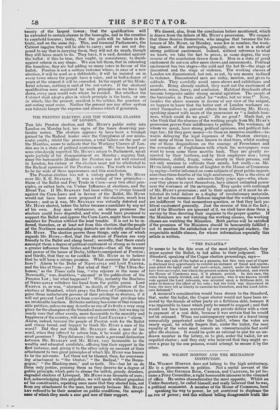"THE PANACEA."
IT seems to be the fate even of the most intelligent, when they argue against the Ballot, to bid adieu to their judgment. The Standard, speaking of the Cupar election proceedings, says- " Men may talk of the ballot as a panacea, but this very case of Cupar is disclosed very opportunely to exhibit an instance of fraud and oppres- sion which the ballot could not meet—which, indeed, under the ballot must have been successful, but which the present system has defeated, and which the House of Commons may, if it pleases, punish. In this case, the votes being nearly divided, one of the persons, who it was known would vote against the Lord Advocate, was arrested upon a fictitious debt, in order to destroy the effect of his vote ; but the trick was discovered in time, the man left at liberty to exercise his franchise, and the Lord Advo- cate defeated."
A moment's consideration would have shown to the Standard, that, under the ballot, the Cupar elector would not have been ar- rested by the friends of either party on a fictitious debt, because it was impossible to know which party he meant to support ; and that would not have been arrested by any private debtor with a view to payment of a real debt, because it was certain that he would not be released. When our contemporary speaks of a fraud being successfully perpetrated under the ballot, where the votes are nearly equal, he wholly forgets that, under the ballot, the near equality of the votes must remain an unascertainable fact until after the election. It would be quite as rational to plot for an un- drawn number in the lottery, as to plot, under the ballot, for an unpolled elector ; and they only who believed that they might se- cure a prize by the one process, would attempt to secure it by the other.


























 Previous page
Previous page